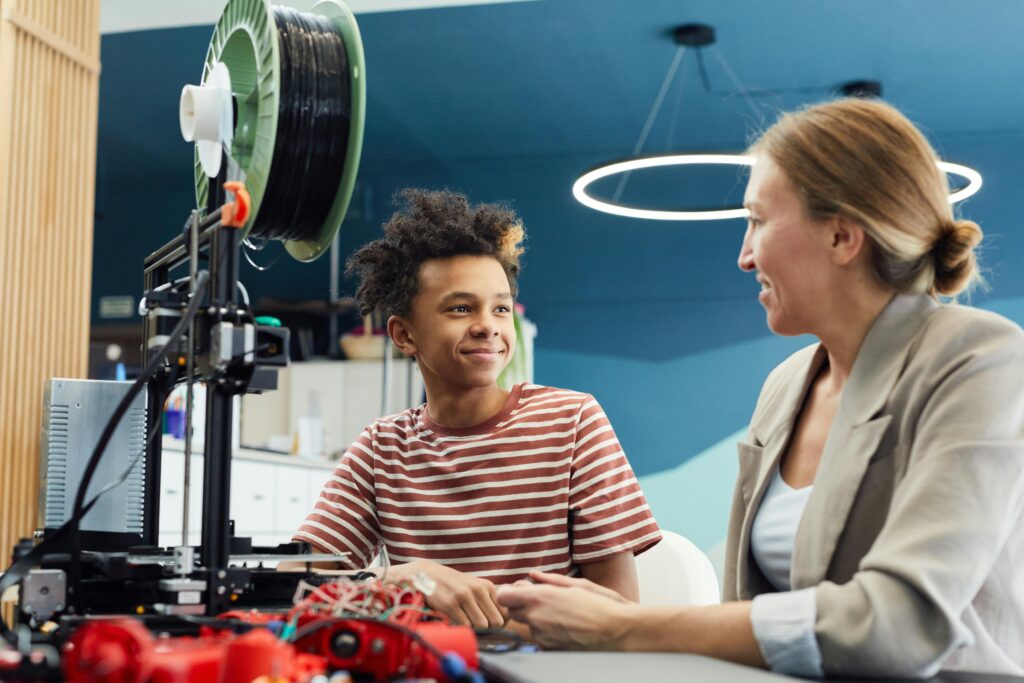Have you been considering a private tutor for your child? 92% of public school parents around the country believed that their children were performing at grade level, according to one 2022 survey of 1,400 public school parents by Learning Heroes. However, a federal survey revealed that according to school officials, half of U.S. students began the academic year behind grade level in at least one subject.
While determining whether or not your child is falling behind in school can be a challenge, there are several signs that can help you decide if your child can benefit from a private tutor. From the value of individualized attention to changing your child’s perception on a subject, private tutoring can provide a wealth of benefits.
Addressing Classroom Challenges
In a study conducted by Learning Heroes and Gallup, researchers found that many parents are relying on a fragment of the information that is needed in order to fully understand their child’s learning progress — typically, this information comes from report cards.
Report cards may provide a broad overview as to how your child is doing in school by averaging the accumulation of grades over a period of time and may even contain a short note from the teacher, though they’re not a true indicator of the struggles and challenges that your child may be faced with on a typical school day.
In addition to the occasional check-in email, regularly attending parent-teacher conferences is a fantastic way to stay on top of your child’s academic performance. Not only will this give you a more accurate indication as to how your child is doing on a daily basis, but will work to provide insight on any specific weak points or challenges that they may be faced with.
For example, some students may simply need more personalized attention when it comes to the class material. Increasing class sizes can be extremely challenging for a teacher to give each and every student the attention necessary in order to excel. With a private tutor, however, students can benefit from more in-depth explanations on a subject, and the ability to ask endless questions.
Your Child’s Study Habits
Your child’s study habits at home can say a lot about their academic performance. How long they take to complete their homework, whether they linger on certain assignments, or constantly asking you for help can all indicate underlying issues — such as not fully understanding the class material.
This can result in regular bouts of frustration and can even lead to a negative attitude surrounding homework time and school in general. According to Tokyo Learning, private tutoring helps students in mastering effective problem-solving methods and test-taking strategies, which can enhance understanding and improve retention.
Furthermore, it’s noted that private tutoring “can significantly transform students’ attitudes towards studying,” by enabling students to experience “light bulb moments” that can help change their perception of a subject.
It’s imperative to note that your child’s study habits can also indicate underlying issues. Symptoms of dyslexia, for example, can tend to appear during childhood, according to Medical News Today, with the condition causing difficulty with reading fluency and comprehension as well as in-depth writing. Whether you plan to have your child tested for dyslexia or they are already diagnosed, it’s important to realize that traditional tutoring typically isn’t the solution, however, a specialized approach can help.
Multisensory structured language education (MSLE), for example, can help students with dyslexia via a specific type of reading instruction. That said, searching for a MSLE tutor can be beneficial — according to Understood.org, tutors that possess the skills to teach kids with dyslexia are often called reading specialists or educational therapists, though it’s noted that tutors can be trained in the MSLE reading programs they use, too.
Advantages of a Private Tutor and Some Considerations
There are many reasons why your child may benefit from individualized attention outside of the classroom in order to supplement their learning, whether you’re noticing a difference in their at-home study habits, have had a recent discussion with their teacher, or if your child could benefit from specialized academic guidance in regard to conditions like dyslexia.
From general homework help to improving an overall grade, addressing specific problem areas or getting extra help in a certain subject, there are plenty of benefits associated with private tutoring. One Parents article, for example, points out that private tutoring is fully customizable and interactive, making it easier to address specific goals. However, finding the right person to address your child’s specific academic needs and goals can be a challenge all on its own.
When looking for a private tutor that can successfully tailor their lessons to your child’s individual needs, a bit of research can go a long way in ensuring the right match. Assessing the suitability, skills, and safety of a potential candidate are essential before hiring someone, especially if they’ll be providing in-person lessons. In addition to a simple internet search, asking for the proper qualifications, and background checking the individual, carrying out an interview is imperative when ensuring that a tutor is fit for the job.
Good first impressions are a must, though an interview will allow you to determine whether there is a chance to develop a good working relationship between yourself, the tutor, and your child. Furthermore, an interview will provide an open opportunity for yourself and your child to ask any questions — whether about the tutor’s teaching style, prior experiences, or even an idea as to what their tailored lesson plans may look like.
Private tutoring may sound unnecessary, though there are a wide variety of advantages associated with a bit of extra, tailored academic help outside of the classroom. While it can be challenging to determine whether or not your child is struggling in school, challenges surrounding study habits, classroom difficulties, and even the need for individualized attention can all be signs.
Images from Pexels



